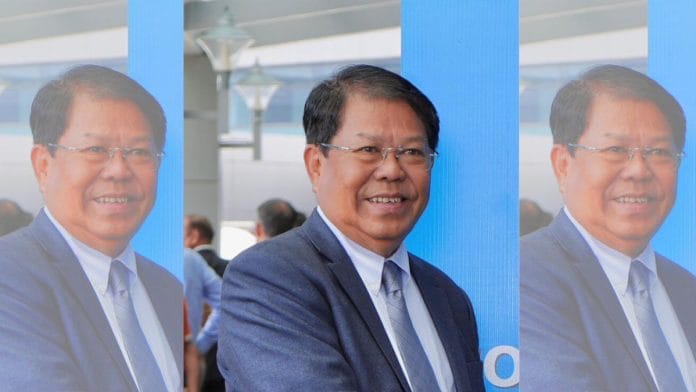New Delhi: U Than Swe, the Deputy Prime Minister and Union Minister of Foreign Affairs of Myanmar, arrived in New Delhi Wednesday for the Bay of Bengal Initiative for Multi-sectoral Technical and Economic Cooperation (BIMSTEC) foreign ministers’ retreat.
“Deputy PM & FM U Than Swe of Myanmar arrives to a warm welcome in New Delhi for the BIMSTEC Foreign Ministers’ Retreat. Productive discussions on strengthening regional cooperation for a prosperous, connected and secure Bay of Bengal region lie ahead,” said Randhir Jaiswal, spokesperson for the ministry of external affairs, in a post on X.
Deputy PM & FM U Than Swe of Myanmar arrives to a warm welcome in New Delhi for the BIMSTEC Foreign Ministers’ Retreat.
Productive discussions on strengthening regional cooperation for a prosperous, connected and secure Bay of Bengal region lie ahead. pic.twitter.com/z46KFbHP6x
— Randhir Jaiswal (@MEAIndia) July 10, 2024
This is the second visit of the Myanmarese deputy PM to India since the end of June. U Than Swe had met S. Jaishankar on 26 June, 2024, while the former was transiting through New Delhi.
The BIMSTEC foreign ministers’ retreat is being hosted by India and is scheduled to be held between 11 and 12 July. Announced by the ministry of external affairs Wednesday, the second retreat in an “informal” setting aims to “broaden and deepen” cooperation in areas such as security, connectivity, trade and investment and people-to-people ties in the Bay of Bengal region.
The seven members of BIMSTEC are Bangladesh, Bhutan, India, Myanmar, Nepal, Sri Lanka and Thailand.
In June, Jaishankar had raised the impact of the “continuing violence and instability in Myanmar” on the borders of India, flagging the trade in illegal narcotics, arms smuggling and human trafficking as “priority challenges”, with his Myanmarese counterpart.
Met with Deputy PM and FM of Myanmar U Than Shwe as he transited New Delhi today.
Discussed our deep concern at the impact of continuing violence and instability in Myanmar on our border. India is open to engaging all stakeholders in addressing this situation.
Particularly… pic.twitter.com/7ewHKxc6ZL
— Dr. S. Jaishankar (@DrSJaishankar) June 26, 2024
The Indian foreign minister also pushed for “credible security protections” for projects funded by New Delhi in the country. India has been building the India-Myanmar-Thailand Trilateral Highway and the Kaladan Multimodal Transit Transport Project in the country. The two projects have faced challenges since the civil war in Myanmar broke out in 2021.
Earlier this year, India had to relocate its staff from its consulate in the city of Sittwe to Yangon, because of the “precarious” security situation in the region. In April last year, India completed the waterway link of the Kaladan project — the deep-water port at Sittwe, as reported by ThePrint earlier.
In 2023, the first foreign ministers’ retreat of BIMSTEC was held in Bangkok, Thailand.
Since the start of the civil war in Myanmar, after the military-led coup d’etat, the leadership in capital Naypyitaw, have faced an international boycott. The political leaders of the country have been disallowed from attending meetings of the Association of Southeast Asian Nations (ASEAN), and were even removed from the rotating presidency in 2026.
Nepal sends foreign secretary
The Foreign Secretary of Nepal, Sewa Lamsal, will be Kathmandu’s representative to the retreat, according to the Ministry of External Affairs. This comes after the political change in Nepal, which has seen the government led by Prime Minister Pushpa Kamal Dahal lose its governing majority.
Dahal last week announced that he would seek a floor test on 12 July, after the biggest party in his coalition, the CPN-UML withdrew its support from his government.
In the 275-member House of Representatives, Dahal’s party, the CPN (Maoist Centre), has only 32 lawmakers and is supported by the Rastriya Swatantra Party with 21 lawmakers and 10 lawmakers from the CPN (Unified Socialist). Two other smaller parties also support him, raising his coalition’s total to 73 lawmakers, according to local media.
The two largest parties in the House of Representatives — CPN-UML and Nepali Congress — have come to an agreement to govern the country for the remainder of the term.
K.P. Sharma Oli of the CPN-UML will lead the country for a year and a half, followed by the President of the Congress Sher Bahadur Deuba succeeding him as the leader of government for the remainder of the term.
(Edited by Tikli Basu)
Also read: ‘Solution can’t be found on battlefield’ — Modi’s clear message to Putin on Ukraine war






